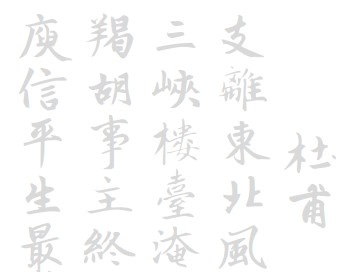Five Songs Inspired by Historic Sites (1) Du Fu From the wind and the dust of the northeast, I fled, And I floated southwest, between heaven and earth. I was perched in a penthouse above the Three Gorges As suns and moons turned. Here the folk of five rivers Reside, in their various local apparel, And I shared their life, cloud and mountain. The Hun who was serving the king proved disloyal, So now this poor bard is reduced to lamenting Vicissitudes, stranded away from his home. A poet named Yu lived a life full of hardship, At the end of his life, his work spread through the country, And moved every heart in the land.
Du Fu left the chaos of the heartland around Chang’an behind, and headed south with his family.
Penthouse: Clinging to the sides of the Three Gorges, locals built cliffside structures that looked from far off like tall, grand pagodas.
Folk of five rivers: It’s a highly diverse area, with a number of different cultural and linguistic groups all living in close proximity to each other.
The Hun: Du Fu is referring to An Lushan, but as usual, deploys a historical allusion. The specific ethnic term he uses is Jie, a small non-Chinese tribe resident in northern China. Historically, there had been a couple of well-known Jie leaders who fell out with or were “disloyal” to their Han ruler.
A poet named Yu: Yu Xin (513-581), instantly recognisable to Du Fu’s readers because the character used to write the his surname, Yu, is very rare. (There are many other, much more common names that are also transcribed into English as Yu.) Yu Xin left his home (Jiangling, modern Nanjing) in the midst of political turmoil, and was ultimately trapped in Chang’an for the rest of his life.
In this series of poems, Du Fu transcends and subverts his genre. Faced with an ancient site, the conventional attitude to take is praise for the past, and worried comparisons with the present. Du Fu gestures in this direction, but his mood is much more mixed. He is a refugee, and complains about his plight; but he is also interested in the new sights and people around him. He uses a historical allusion to point up his fear that he may never return home, but is slightly distracted by the fame that hardship brought for the poet of the past. A thoughful, discursive tone fills this series of five poems. They feel like works in progress, without any of the certainty that Du was able to bring to earlier work, before the war.
杜甫 咏怀古迹五首·其一
支离东北风尘际,漂泊西南天地间。
三峡楼台淹日月,五溪衣服共云山。
羯胡事主终无赖,词客哀时且未还。
庾信平生最萧瑟,暮年诗赋动江关。



